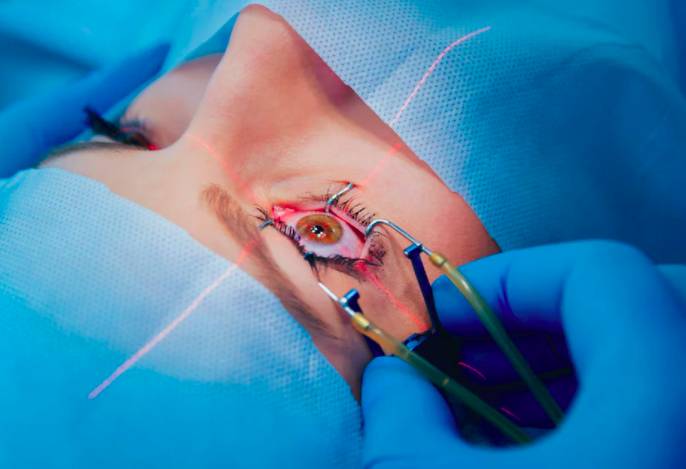A cataract is a blurring or clouding of the normally clear lens of the eye. Cataracts can block light, making it hard to see clearly, and they can cause blindness if untreated for a long period of time. Although cataracts are normally associated with aging, they can also develop in young people. Luckily, cataract surgery can help remove the cataract and restore the sight of the patient.
Table of Contents
How Does a Cataract Form?
A cataract is a clouding of the lens of the eye. The lens refracts light that shines into the eye onto the retina. The retina is a membrane inside the eye that is light-sensitive and acts similarly to film in a camera.
Eye clouding occurs when medical and age-related conditions cause fibers and proteins in the eye lenses to break down and clump together. The blurring gets denser as cataracts develop.
During the initial stages of cataract development, wearing glasses can enhance your vision. The glasses may, however, not be effective as cataracts progress, and your optician may recommend cataract surgery.
What Causes Cataracts?
- Age-related cataracts: In most cases, cataracts occur due to normal eye changes as you age. Around the age of 40, the proteins in the eyes can begin to clump together and block vision.
- Pediatric Cataract: Some children can have congenital cataracts at birth or develop cataracts in childhood due to injury or some other cause.
- Radiation Cataract: Some radiation, especially on the upper body parts, may cause cataracts.
- Traumatic Cataract: Severe eye injuries can affect your lens and cause cataracts.
You are at higher risk of developing cataracts if you:
- Have a family history of cataracts
- Use alcohol heavily
- Smoke
- Have diabetes
How Can You Know You Have Cataracts?
The best way to determine if you have cataracts is by having an ophthalmologist perform an eye exam. The following are some of the common signs of cataracts:
- Filmy, foggy, blurry, or cloudy vision
- Nearsightedness, mostly in older people
- Doubled vision
- Glare problems during the day
- Driving problems at night
- Changes in your color view
When to Consider Surgery
Having cataracts doesn’t always mean you require surgery. At times you may not realize any change in the way you see. Your vision may seem fine if you wear prescription glasses, rely on a brighter light, or use a magnifying lens. You may need to consider cataract surgery if you have the following symptoms:
- Vision that is blurry or cloudy
- Halos around lights
- Common sources of light seem too bright
- Seeing double
- Seeing poorly at night
- Frequent changes in your glasses prescription
- Colors looking faded
Cataract Surgery
You may need to consider cataract surgery if other ways of managing cataracts, such as using eyeglasses, brighter lighting, or magnifying glasses, no longer help you carry out daily activities effectively.
Cataract surgery entails removing your eye lens and, in most instances, replacing it with an artificial lens. An experienced eye doctor (ophthalmologist) performs the surgery. You will not need to stay overnight after the surgery since it is usually an outpatient procedure. Medical professionals can give you instructions for post-surgery care. If you have cataracts in both eyes, plan for two procedures — one on each eye — about four weeks apart.
See the Best Ophthalmologist Today
If you leave cataracts untreated, your vision can slowly get worse. and with time, you may be unable to see. Surgery is the most effective cataract treatment to enhance vision, and most people say they see better after the surgery.
The best ophthalmologist has state–of–the–art technology and equipment to offer the best patient outcomes. They focus on offering the best possible client experience during and after cataract surgery.








